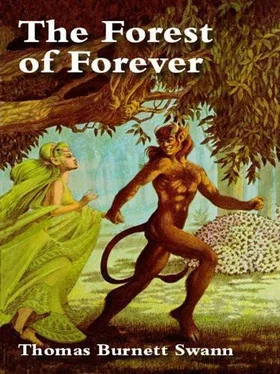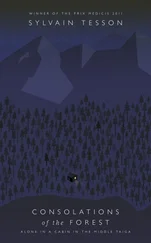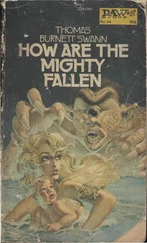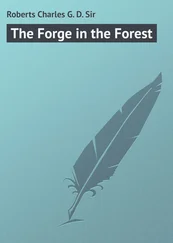Thomas Swann - The forest of forever
Здесь есть возможность читать онлайн «Thomas Swann - The forest of forever» весь текст электронной книги совершенно бесплатно (целиком полную версию без сокращений). В некоторых случаях можно слушать аудио, скачать через торрент в формате fb2 и присутствует краткое содержание. Жанр: Фэнтези, на английском языке. Описание произведения, (предисловие) а так же отзывы посетителей доступны на портале библиотеки ЛибКат.
- Название:The forest of forever
- Автор:
- Жанр:
- Год:неизвестен
- ISBN:нет данных
- Рейтинг книги:3 / 5. Голосов: 1
-
Избранное:Добавить в избранное
- Отзывы:
-
Ваша оценка:
- 60
- 1
- 2
- 3
- 4
- 5
The forest of forever: краткое содержание, описание и аннотация
Предлагаем к чтению аннотацию, описание, краткое содержание или предисловие (зависит от того, что написал сам автор книги «The forest of forever»). Если вы не нашли необходимую информацию о книге — напишите в комментариях, мы постараемся отыскать её.
The forest of forever — читать онлайн бесплатно полную книгу (весь текст) целиком
Ниже представлен текст книги, разбитый по страницам. Система сохранения места последней прочитанной страницы, позволяет с удобством читать онлайн бесплатно книгу «The forest of forever», без необходимости каждый раз заново искать на чём Вы остановились. Поставьте закладку, и сможете в любой момент перейти на страницу, на которой закончили чтение.
Интервал:
Закладка:
The child clung to him with the tenacity of the animal he resembled. Aeacus had to disengage his fingers, gently but firmly, and hand him to one of his men. He would have liked to stay in the ruined house, bury the parents with the proper services (wherever their ghosts might roam), feed the child, and tell him stories of friendly dolphins and dog-headed fish. When I return to the court, he told himself, I will wed and have a child. Many children. Perhaps it was for them I have sighed, for my unborn children. The tree had whispered of-something.
An hour’s march from where he had left the boy, in the midst of a rocky, pitted meadow, he met the Achaeans. The pits disgorged warriors, the rocks came to life, and the little Cretans found themselves beleaguered before they could draw their daggers.
Draw them they did at last, and then it was an equal fight. Like blue monkeys beset by dogs, they fought the big-bodied, blond intruders, nimbly sidestepping their sword thrusts, thrusting with their own daggers, until a single Achaean limped from the field, and Aeacus stood alone among his fallen men, too tired to give chase, scarcely strong enough to support his own weight, wounded-if not to death-at least to a dazed benumbment.
He looked at his slain friends in the midst of the field and looked around him dazedly and saw that he was not far from two great cliffs with a forest narrowed between them like a wedge. He caught the healing fragrance of bark and oak leaves and heard the faint rustling of water. Perhaps he could find a stream and bathe his wounds and return to bury his friends. Could he walk so far?
Dimly he recognized the forest. The Country of the Beasts, where no Cretan ventured, half from fear and half from remembering a covenant made before the beginning of recorded time, before there had been any scribes to scratch history on clay tablets, that this one forest belonged inviolably and eternally to the Beasts.
Still, the trees whispered to him: cone-shaped cypresses, smoothed and sculptured as if by the nimble fingers of the Great Mother, and tumultuous oaks whose branches seemed little jungles. “You may break the covenant,” they seemed to say. “Enter our deepest shadows and learn our mysteries and yes, our terrors, but even terror can be beautiful.”
The sun gaped like a wound; the limbs were succoring hands which comforted and promised to heal even while they threatened to hold.
He stumbled into the forest.
He lay on the ground, eyes closed, poised between sleep and waking. He heard the rustle of bushes. Painfully he opened his eyes and saw a young boy, no, a young bull. No, a brawny bull-boy with silken red hair punctuated by horns. He tried to raise his hand. The boy stepped back from him with evident alarm.
“I can’t get up,” Aeacus said. He lay in his own blood and wondered with more curiosity than fear if he were going to die. The boy circled him, approached, confirmed his helplessness, and spoke in a deep but musical Cretan.
“Shall I help you up?”
Aeacus deliberated. “I don’t know. I might start to bleed again. Perhaps you could first bind my wounds.”
“Let me bind your wounds.”
She had come so quietly that Aeacus and evidently the Minotaur boy (for that seemed to be his race) had not even heard her approach. She had come through the trees, or out of a tree, it was hard to say. She was taller than Cretan ladies and she wore, in place of their bell-shaped skirts and open bodices, a loose flowing gown the color of leaves and a necklace of orange berries. Her hair was green like her gown, swept above her head in a knot, and held by a silver pin in the shape of a grasshopper. Her ears, thus revealed, were delicately pointed. The boy looked at her with surprise and doubt.
“We can take him to my house,” he said.
“Mine is closer, Eunostos. But first I must clean his wounds.” She knelt beside him and touched damp moss to a cut on his shoulder. The relief was immediate, but whether from the moss or the administering hand, he could not be sure.
“And what shall I do?” asked the Minotaur boy, seemingly aggrieved at being replaced as the rescuer of this wounded stranger. Aeacus liked him.
“After he has rested,” she said, “you shall help me carry him to my house. We shall make a litter from sticks and vines and carry him as hunters carry a stag, though much more gently, of course.”
“What is your name?” Aeacus asked.
“I am Kora, the Dryad.”
“And where is your house?”
“In a tree. Where else?” she laughed.
Aeacus closed his eyes, assured of his rescue and unashamed of his helplessness, since there is nothing more welcome to helpful people than those who need to be helped. It was not long until the girl and the Minotaur boy had fashioned the litter and his body swayed to their gliding steps as they carried him into the forest, into the Country of the Beasts.
In spite of his wounds, he did not sigh.
CHAPTER IX
In Eunostos’s absence, I greeted his guests and tried to put them at ease. Here was Partridge, heading at once for the skin of fermented onion juice and avoiding the other guests with the zeal of one whose conversation was limited to “huh” and “can’t” and “don’t know.” Here was Bion, hovering at the door as though he were not sure of his right to mingle with the higher orders of Beast; after all, there were those who considered him a mere domestic. I took him at once to the largest table and soon he was clutching a loaf of wheaten bread between his forelegs and happily bobbing his head. And Moschus-surely I would have trouble with Moschus, who always arrived drunk and began his amorous advances with his salutations. Tonight he was drunker than usual and accompanied by an uninvited guest, no friend of Eunostos, a frowsy young Dryad of about fifty.
“There are more birds on the limb than one,” he smirked to me, proceeded to fling a large beerskin over his shoulder, and retired with his friend to the garden.
“Yes, cuckoos,” I called after him.
There were Centaur boys who clamored to see Eunostos’s workshop, though they could not climb his ladder and had to content themselves with peering into the shadows at the workbench, the tools, a chair without legs, the embryo of a table. There were Bears of Artemis who had to be coaxed out of corners with compliments on how artistically they had strung the black-eyed Susans, and-But why bore you with a list of the guests? Eunostos had innumerable friends; he had only excluded Panisci (except for Partridge) and Thriae.
But all the time I was worrying about Eunostos and waiting for him to return, and feeling that the Cretan could not have chosen a worse day in the year to invade the forest, even if he was wounded, and Chiron ought to exile him as soon as he had recovered his strength.
Just about dusk, Eunostos walked in the door as if he had forgotten it was his own wedding day, looking puzzled, troubled, and solitary.
But of course everyone hailed him as the happy bridegroom and in the next breath wanted to know about the Cretan. Some had glimpsed him but no one had dared to speak to him. Being a Man, he was presumed to be dangerous.
“Weren’t you scared, Eunostos?”
“Is it true he doesn’t have horns or hooves or fur or anything?”
“Did he soft-talk you and then try to slip a knife between your ribs?”
“He was badly hurt,” said Eunostos. “Kora took him to her house to nurse his wounds.” The guests remained quiet, waiting for details; waiting in vain.
“But the wedding,” I cried at last. “It’s time for us to go and summon the bride from her tree!”
“She said we were to go on with the feasting without her. Pretend it was a festival to the Great Mother or something. The wedding will have to wait a day or two. Otherwise, the Cretan may die.”
Читать дальшеИнтервал:
Закладка:
Похожие книги на «The forest of forever»
Представляем Вашему вниманию похожие книги на «The forest of forever» списком для выбора. Мы отобрали схожую по названию и смыслу литературу в надежде предоставить читателям больше вариантов отыскать новые, интересные, ещё непрочитанные произведения.
Обсуждение, отзывы о книге «The forest of forever» и просто собственные мнения читателей. Оставьте ваши комментарии, напишите, что Вы думаете о произведении, его смысле или главных героях. Укажите что конкретно понравилось, а что нет, и почему Вы так считаете.










